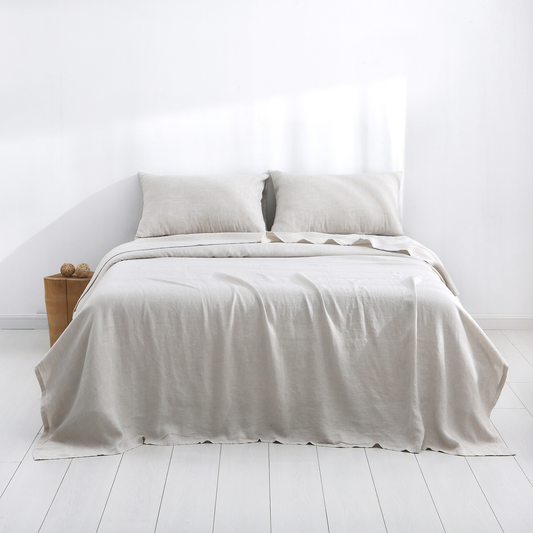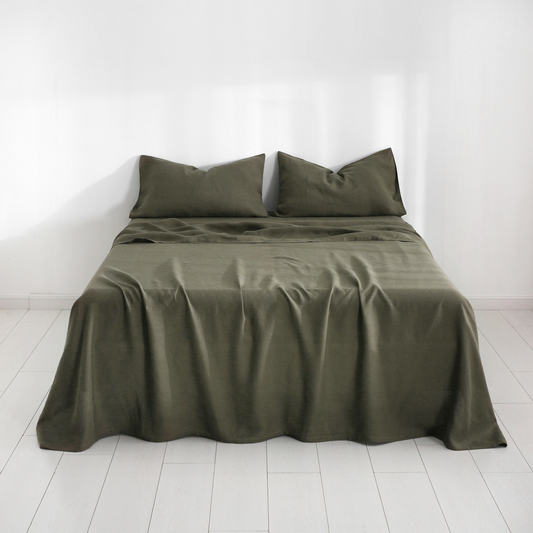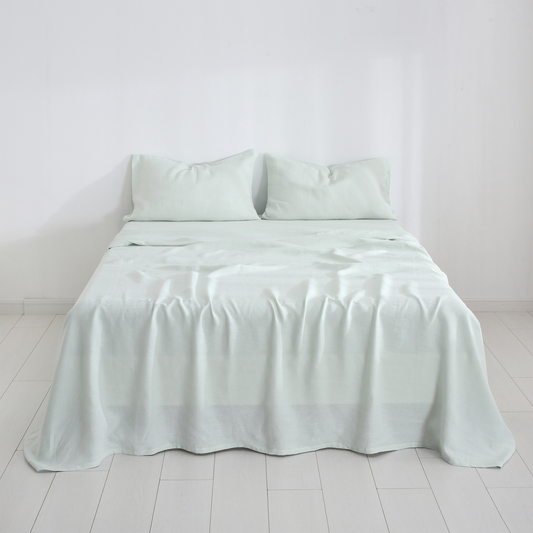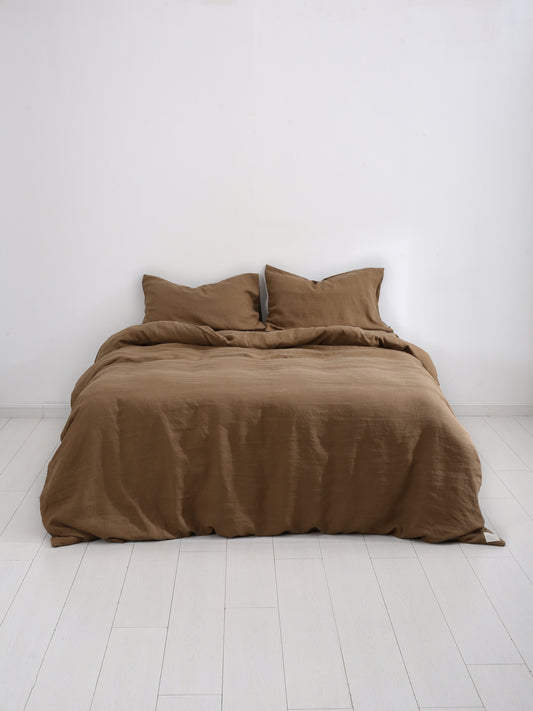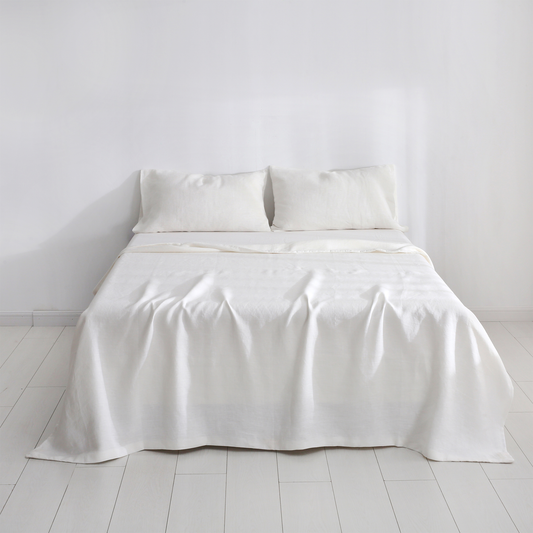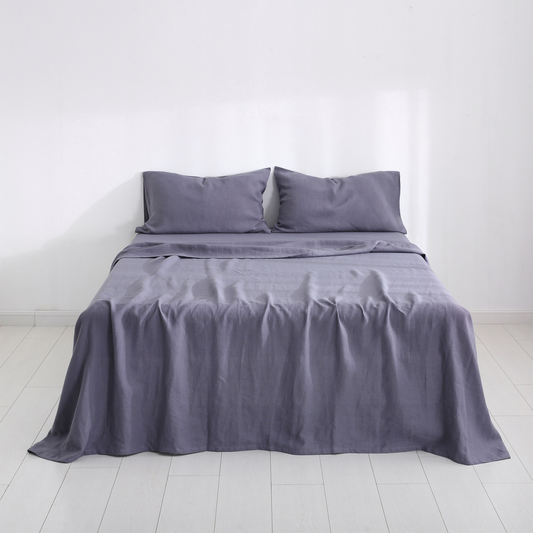Find Hemp Linen & Bedding expensive? Compared to what?
By Bailey Pyman
Hemp is a super material.
It can be used in a myriad of ways and has the capacity to be grown at scale and become the cheapest fabric on the planet - just like it was in the heyday of the British Empire. It has applications in medicine and provides nutritional value in the form of oil and foods. In fact, there may be 50,000 uses for hemp overall
One way the hemp plant is widely used today is as a material textile to produce many types of durable clothing. And you know from us here at JoDope that hemp can be turned into sustainable bedding that is luxurious. But somehow, cheap hemp bedding or other hemp products don’t exist. How is this so? Why is hemp bedding so expensive compared to polyester and cotton?
As we explore elsewhere on our platform, this plant can be cultivated fast without the use of pesticides, harvested in high amounts, and leaves fertile ground to keep production.
Compared to other non-eco-friendly materials like cotton or polyester, hemp has a much better impact on the environment and waterways.
Ideally, we should be in a win-win situation that provides eco-friendly clothing and bedding while also being affordable.
So, let's explore some of the issues with the manufacture, supply, and history of this time-proven material.
What is the history of hemp?
The many uses of hemp are not new. We are only witnessing a resurgence of this almost miraculous plant. Its applications stretch back to ancient civilisations. It was even commonly cultivated and harvested up until the mid 20th century.
However, in the decades that followed, we've seen the outlawing of its production and usage. But recent times have seen that begin to shift back.In the United States, for example, industrial production is now permitted due to the 2018 Hemp Farming Act. Hemp is now considered a common agricultural commodity in the US.
Here in Australia, the process has also been a long one to re-establish hemp as a legitimate crop. Happily, as of today, the fibre, stalk and seeds can be used from the cultivated plant for industrial purposes. This allows us to create our comfortable hemp bedding, here in Australia.
Still, why is hemp expensive in Australia?
In the beginning, permission for hemp use was purely medicinal. In Australia, the Industrial Hemp Act of 2004 allowed the cultivation, harvest, and processing of hemp industrially.
Growers could then harvest the plant for its fibre and seeds. It was not until 2017; however, that hemp was authorised for internal consumption as food in Australia (mainly in the form of seeds and CBD). And it does suffer from various food regulations.

The time taken to set up a licence for growing hemp also means lost money, especially with the fees that must be paid. Then, potential growers have to deal with the THC-content levels of their plants. In Australia, different states have different limits, and many growers give up on the idea of starting to grow hemp. They must comply with paperwork, demands, and a financial toll that comes from bureaucratic oversight and red tape.
Hemp production continues to be considerably lower than it should be; for the sake of the planet and for the people. And in Australia, much of the hemp processed here has to be imported. All of this amounts to higher prices on products that are made from hemp.
Lastly, the demand is actually quite high for quality hemp products. Whenever the price starts to dip, our high-quality products become profitable overseas to export and thus, the price in Australia will stay high for quite some time yet.
Of course, hemp would be cheap and be without the supply and regulation issues in Australia, had the hemp plant not been suppressed for 77 years.
Why was hemp suppressed in the first place?
We first need to understand the still existing confusion between hemp, marijuana, and cannabis. Essentially, they are all part of the same plant family, with significant differences. A variety of plants of the genus Cannabis, hemp and marijuana varieties are from the same species of Cannabis, named Cannabis Sativa.
The main difference is that hemp plant varieties are grown to have a much lesser quantity of THC (the property of Cannabis with psychoactive properties) than marijuana types have. Hemp's quantity of THC is negligible and if consumed internally, does not leave the consumer in an altered state of mind or consciousness.
However, post-World War II and especially through Nixon's 'War on Drugs' era, all three names have incorrectly been bunched together. This led people to believe that all were the same thing and all were a 'drug' that induced a 'high' or toxic state of mind.
Essentially, this was the reason that led to its criminalisation in all forms, including for industrial use. And so, the world has vastly increased the production and harvesting of other raw materials, such as cotton and polyester, in their industrial activities.
Now, the world is clarifying the hemp and cannabis confusion and rediscovering hemp's amazing properties and uses. At the same time, hemp is increasingly the centre of attention of people that fight for its legalisation for agricultural and industrial uses.
Efficiency in the production of cotton vs hemp
Ways of efficiently harvesting and processing hemp for fibre were being developed up until the 1950s, but with the plant's banning, this halted and shifted.
With the advancements in technology and significant support and funding from lobbyists and governments worldwide, it was only natural that other, less environmentally-friendly alternatives evolved in their production efficiency.
Rather than us taking lessons from history, in our hubris, we tried to rewrite history and create an alternate solution, a solution that wasn't the best for humanity or this planet. We invested in better machines and cheaper methods of seeding, growing, harvesting, and processing alternatives to hemp.
Harnessing technology leads to higher efficiency and, over decades, does lead to lower costs of processing materials.
We can safely assume that the same will happen to hemp. As the practice evolves and the number of cultivators grows, an inherent need for better, more refined methods will appear (or even re-appear).
The evolution of science will help us understand this great plant, its benefits, and its applications. And technologies will be developed to increase the efficiency of the whole process from seed to processing, resulting in cheaper costs.
It will further allow more capable means of producing the different end-products that hemp can naturally bring us, such as our hemp sheets, blankets, and pillowcases. In time, we hope that efficiency lowers the price of hemp and its by-products.
But while we wait for the world to catch up, hemp harvest stays a relatively expensive process. The plant is mostly hand-trimmed, which is an intensively laborious method, and there aren't that many people doing it. Some properties, like cannabinoids, terpenes, and flavonoids, need to be extracted from the plant. This lengthens the whole process, requiring more labour and more money.
Hemp has a Social Stigma from demonisation
The hemp plant is still misunderstood, and it suffers from its demonisation in the 20th century. More people and more doctors are researching and familiarising themselves with hemp's potential for health and day-to-day benefits. Information about it is now quickly being spread, and hemp's recognition is on the rise especially in medicine.
However, it is still considered a 'drug' for 'stoners' by many. Granted, its cannabis counterpart does have recreational uses. But it must not be confused with hemp, which contains negligible amounts of the psychoactive THC, and that we use to produce our eco-friendly hemp bedding. Hemp is a very sustainable crop that is far from being a subject for inhaling and 'getting high'.
The mindset surrounding this plant will eventually be turned around and will be more widely accepted. While the word cannabis or hemp is still stigmatised, demand for hemp products and more efficient ways to produce them may remain low. Thankfully, we have science and many successful cases that help reframe the plant's place in society.
Cotton, on the other hand, remains widely popular and sought after and many are closed to viewing this plant as it can be problematic. We have discussed how cotton production is more damaging to the soil and the environment in previous blog entries . As soon as we shift to hemp, we are confident the planet will thank us for it. And as supply and demand for hemp products rise, the price will lower thanks to the scale, becoming a more affordable, eco-friendly option for all.
Sustainable Bedding in Australia will reduce our carbon footprint
We are enthusiastic about hemp and the use we have for it. We took the opportunity to join this evolution to provide you with sustainable hemp bedding and all the antimicrobial, thermodynamic and comfort benefits it can bring to your bedroom.
And best of all, growing hemp actually reduces our carbon footprint unlike cotton.
You can find our hemp blankets, bedsheets, and pillowcases on our store page.
You can take a leap to the future and be ahead of the curve by getting hemp bedding now. You can consider it a long-term investment since hemp fabric creates strong, more absorbent, and durable products. It also creates further demand for hemp products, sending a clear message to governments and corporations that the people want this product and more of it. Eventually, this will help make it cheaper.
It's an ethical choice that guarantees you a comfortable sleep.
The Future Looks Bright
In any case, we are hopeful for the future. Hemp will rise in relevancy, and more people will see how great this plant is in all its applications. It might be a slightly more pricey choice today, but as demand increases (and it will), the prices of hemp's amazing by-products will lower.
We made it our mission to create and bring you new sustainable choices in ways that don't sacrifice comfort or high quality but improve your bedding. You can now make an impact and contribute to the healing of our world.

We hope to have you feeling confident about this almost miraculous plant like we do. We encourage you to not stop with hemp bedding! Its medical and nutritional value will bring new benefits to your life!
If you are producing or looking to produce hemp products contact us. We enjoy collaborating and bringing sustainable products to life in the marketplace.
Please browse our range of bedding on our website now , and feel the difference between a set of dope comfortable hemp sheets today. And when you do - invite your friends, the planet will thank you!









